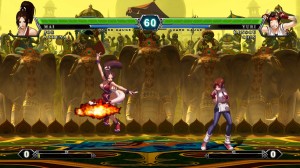What Do We Game For?
by RadiumEyes, HSM team writer
Look through the games list of earlier consoles, and you will likely find a good number of games that utilized a high difficulty curve – the NES, in particular, has several examples, with the very first installment in the Ninja Gaiden series being one of the most famous (and popular) outings for the system.
At the same time, however, several games utilized cheap tactics to make the experience more frustrating than challenging – the controls may be stiff, the objectives may be obtuse, the game may be uglier than anything, and other irritations can make a game feel like a chore instead of a fair challenge. James Rolfe, famous for his role as the Angry Video Game Nerd, made a video of the ten games he felt had the worst controls – admittedly, an exaggerated view, but it illustrates how poor controls could break a game. Rofle revels in exaggeration while playing the Nerd (that’s his while idea), but there is something there – games aren’t always awesome, and we remember the great games for that reason. From Super Mario Bros. to Borderlands 2, there are many stellar examples of how game concepts come together to make a wonderful whole.
I preface this article with that brief introduction because how you approach a particular game (and what you get from it) depends on a number of factors; different genres have different expectations out of the gamer, and the effectiveness of one particular production can be hampered by any number of problems such as those mentioned above.
We’ve come to accept the fact that difficult games can come in a variety of forms – they can be tough but fair (for example, the aforementioned Ninja Gaiden had a pretty significant learning curve, but the controls and story worked smoothly), or they could make one wonder how they got past beta-testing (for example, Action 52 has some poor controls and no real story direction). As games got larger, core concepts remained (e.g., RPGs usually have a common system of leveling up your characters, and shooters gave you plenty of guns), but some fairly recent ideas sprung to life in the process; nowadays, you can play with people from around the world through online multiplayer, and the sheer size of some games can mean you’re traversing a landscape larger than entire cities.
But what about the gamers themselves? Do we have our own perceptions and expectations about how to play, and subconsciously “rate” others on their performance?
If you’ve ever come across someone who unfairly judges an entire subset of gamers based on an inaccurate perception, you can see where this is headed – it’s an extension of social interaction based on pop culture, especially those media that took a while to be fully accepted by the mainstream. Back in the ‘80s, Nintendo had to deal with the apprehensions of gamers and parents alike after the great video game crash of 1983 (the result of many bad decisions, such as the apparent poor quality control on Atari’s consoles, allowing any sort of game, good and bad, to be released on it without prior approval), and the Famicon (known as the NES in the States) originally had a toy-like color scheme that would stand it apart from the Atari predecessors. After the company gained a dominant foothold in the industry, the NES got a redesign (becoming the now-familiar gray, a change that came about as Nintendo courted the international market), and it eventually no longer had that “toy” aspect to it; Nintendo reigned during the 1980s, and the subsequent Super Famicom further cemented Nintendo’s reputation as a great console developer.
Readers may remember the great times they had with these two consoles – games such as StarFox, Chrono Trigger and The Secret of Mana all debuted on Nintendo hardware, and they remain classics in the respective genres. However, there also comes with that nostalgia a feeling of “elitism” – the idea that one is “better” than someone else for being the “better” gamer for a variety of reasons. People who played Famicom games when they were new might speak of the “good old days” of the difficulty curve and whatnot, but there’s always the reminder that a lot of games from the ‘80s and ‘90s didn’t succeed; games like Action 52 or Silver Surfer rarely get mentioned today, the former particularly because of its bad game design (most of the games were side-scrolling shooters and didn’t make any real sense, to give an idea of how odd Action 52 turned out to be).
Today, discussions about gaming raise an interesting question – do modern games promote a “lazy” gameplay ethic, whether through simplifying the controls or holding your hand the entire time? Do people act lazy because they’re unwilling to learn the ropes of the more “complex” games?
This part of the modern gaming world can be quite divisive – who wants to be called “lazy” because of their game habits? Can we really call anyone “lazy” at all when it comes to their entertainment preferences? Well, that’s what I’m looking at for this article.
To begin, let’s look at some of the issues that complicate this topic – for starters, various genres have different requirements, and even within one genre, one can find different approaches. RPGs grew exponentially since the SNES days, and now we have MMOs contending for the spotlight – games like Final Fantasy XIV incorporate socialization into the mix, whereas earlier games such as Chrono Trigger and Final Fantasy VI were stand-alone games without the option of direct interaction from others playing the same game at the same time as you. Dark Souls became famous for its difficulty, but to what end? It became a bestseller, and a critically-acclaimed release to boot, but the focus on the game’s difficulty misses an important element of the RPG – immersion. If you focus too much on one aspect (in this case, making it really tough to play), you risk sacrificing other aspects; in this case, I’ve never even heard mention of the story, only how difficult Dark Souls is. And fans of the game want this to be a selling point, to the point where they criticize every other game on the market as being too easy or “babying” – an exaggeration, but not without some truth to it. Beyond: Two Souls, for example, received criticism for its passive gameplay; the IGN review of it notes both the “schizophrenic, alienating feeling” of the game’s story and the awkwardness of the controls, as well as the way the game outright tells you what to do or where to go.
Such disparate games as these fuel debates over the state of the industry today – they represent a dichotomy of “hand-holding versus frustration” that unfairly overshadows the other offerings available to gamers. Simultaneously, gamers do rant about the supposed “laziness” of those who don’t play (or commit much time to) those releases generally considered challenging by the audience – Dark Souls being a good example of how gamers could frame their criticisms of their fellows through an arbitrary notion of what it means to be a “real” or “good” gamer. This would be comparable to film scholars and critics having a low opinion of the “popular” films (such as the Transformers films) because they don’t meet their rigorous standards of cinematic excellence – you can still enjoy the film, but if you do, people think you’re a plebian for preferring it over such films as Citizen Kane and Taxi Driver. Michael Bay’s films based on the Transformers franchise certainly have their flaws (one can note the frenetic pace of the fights, and the use of CGI as examples of where the films fail to shine), but they weren’t meant to be haute couture masterpieces; Bay wanted explosions and robots, and he delivered on that. A more recent comparison would be Pacific Rim – the film caters to a specific crowd, fans of mecha anime and kaiju films, but it can be alienating to others who don’t have the same interests.
The same situation applies to games: people play different games for their own reasons. Whether you’re a competitive player who regularly attends tournaments, or a casual gamer that plays more for the experience, the industry has a wide variety to choose from – and individual games cater to individual tastes. LEGO Pirates of the Caribbean is rather easy compared to, say, learning how to pull off a long combo in a fighting game, but that doesn’t diminish LEGO Pirates’ appeal. It’s comparing apples to oranges – two different experiences with different intentions in mind. The idea of “laziness” comes in when people begin criticizing others’ gameplay habits that don’t adhere to their idea of “good playing” – you can see this on both sides, with some hardcore gamers claiming that casual gamers are more juvenile in their approach, while some casual gamers retort that hardcore gamers have too much time on their hands. These two attitudes miss the mark, as they generalize large groups of people based on the actions of a few (or the preconceived notions gamers have about each other); “laziness” falls into this same trap.
One doesn’t have to look that far to see the origins of some of the arguments – games like Heavy Rain and Beyond: Two Souls (both released by Quantum Games) have their own issues, the former with a problem I will call “QTE syndrome,” wherein much of the game’s interaction relies on the player pressing a single button when prompted to do so. This feels more along the lines of “interactive cinema,” where scripted moments give the audience some limited control over the production; games like Policenauts contained the same mechanics, with an “on-rails” narrative that gave players some interaction.
This can definitely be frustrating – games that provide a very linear pathway, and offer little input from the player, leave a sour taste in one’s mouth, and thus they become unrewarding. Players want direct interaction, where they have as complete control over the character as possible; that way, if they screw up, they understand what went wrong and can replay that section with a different tactic. If a developer wrests that opportunity away from us, the resulting game plays more like a movie; we could get a similar experience from a book or film, but a game shines when it allows players to play at their own pace. The cries of “laziness” may stem from this frustration, as well as fears of an industry making “babying” games that place conspicuous trails of light (or text overlays, or any other sort of indicator) to show the player what to do; yet, not every game does this, and games like Dark Souls and Heavy Rain stand out because they’re outliers.
Now, to address the claim of “laziness” more directly:
The sheer variety of games, and how to play them, makes this claim spurious; I will use myself as an example. People who read my article on depression will be familiar with my psychological issues – panic attacks came come at any time, even without any warning, and it becomes quite the ordeal. For me, sitting through a game that requires a good effort to sit through would be stressful on me – not to mention tournament play. I’m very shy in social situations, and playing competitively can very well trigger panic in me; thus, I would do rather poorly in that environment. Playing with a group of close friends, and truly enjoying the experience (without much regard to who wins or loses) is much more beneficial to me, as it allows me to socialize and have fun, instead of worry about how I compare to someone else.
Trophy counts, bragging rights, playing competitively – these don’t appeal to me, because they detract from the fun. I do see the appeal of competitive gaming, of course – matching your skills against someone can be a thrill and fun diversion; yet, I do not go for tournaments because I’m too shy and anxious to really function well in an environment that would stress me out.
The idea of “laziness” (as well as “too much time on their hands,” that pejorative statement occasionally lobbed at “hardcore” gamers) strikes me as being too simplistic for the reasons stated above – people play different games for different reasons, and berating them for not playing a certain way inadvertently presents the message of “play the right way or don’t play at all.” I would be very upset if I got labeled as “lazy” by people who didn’t understand my own personal issues; hardcore gamers would likely empathize, as it’s not exactly fair to generalize any group for misconceptions.
For me, gaming is a form of emotional therapy – I want to have fun, not exacerbate my stress, and “hardcore” gaming could very well fall into the latter description. I’m very delicate emotionally – games like Resident Evil 6 and The Walking Dead frighten me because of the depiction of violence and the moral dilemmas one faces in such games – and putting me on the spot by saying I’m “lazy” for not going for the more “hardcore-oriented” outings would trigger my anxiety.
For now, I will play games like Borderlands 2 and LEGO Pirates of the Caribbean at my leisure, knowing that I don’t have to prove myself to be a “hardcore” gamer to anyone; games are, first and foremost, there to be enjoyed, and creating divisions amongst ourselves will raise tempers and frustrations.
Share
| Tweet |






 Twitter
Twitter